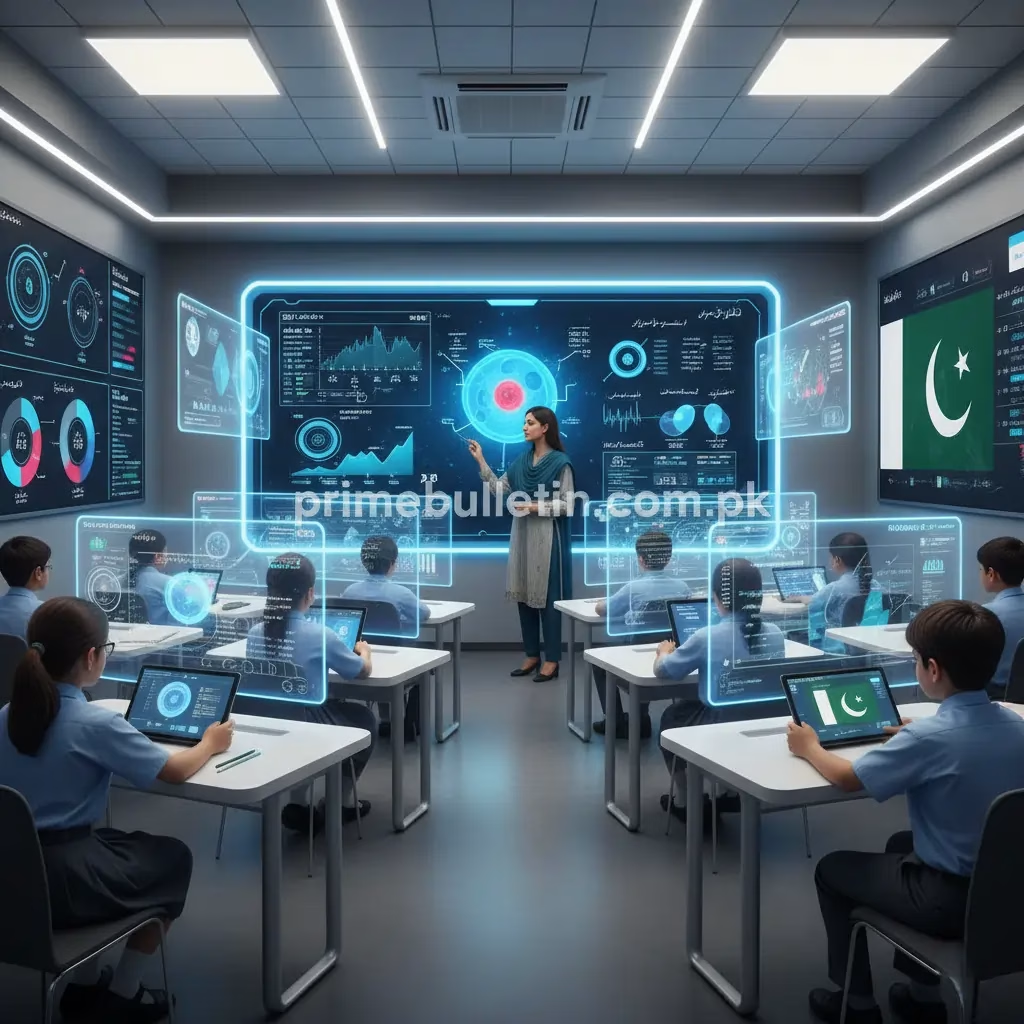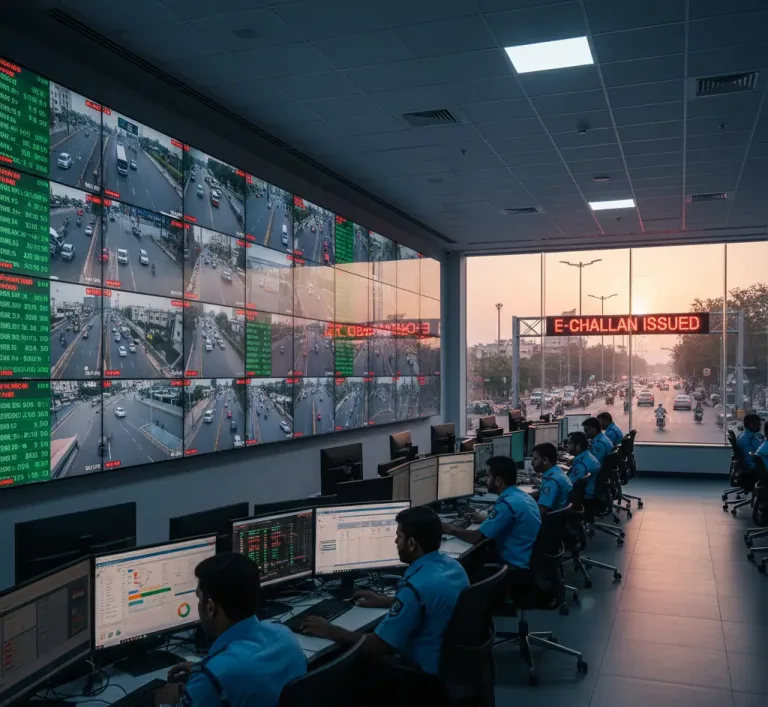
Pakistani students in a smart classroom using AI technology and digital tools
Transforming Pakistan’s Education System
In 2025, Pakistan’s education system is witnessing one of its most significant overhauls in decades.
From Artificial Intelligence (AI) in classrooms to digital curriculum reforms and hybrid learning, policymakers are pushing for a modern, skill-based education model that prepares students for a global digital economy.
These education reforms aim to replace rote learning with critical thinking, creativity, and technological literacy, marking a major leap toward innovation in Pakistani schools.
AI in Education — The Digital Classroom Revolution
Artificial Intelligence is no longer a futuristic idea; it’s becoming a classroom reality in Punjab and Sindh.
Schools are adopting AI-based software to improve student learning outcomes, automate grading, and enhance lesson planning.
Top Benefits of AI in Pakistani Schools:
-
Personalized learning tailored to each student’s strengths and weaknesses.
-
Automated grading systems reduce teachers’ workload.
-
Smart dashboards track student progress and attendance.
-
Early detection of learning gaps using data analytics.
However, experts note that successful AI adoption depends on teacher training, stable internet access, and data security measures — especially in rural schools.
Punjab Leads Pakistan’s Education Reform Drive
The Punjab Smart Learning Initiative (PSLI) is leading education reform in Pakistan.
The provincial government, in collaboration with EdTech companies, is providing digital tablets to teachers and digitizing textbooks to create AI-enabled smart classrooms.
Key Features of Punjab’s Smart Learning Program:
-
AI-powered classroom monitoring and interactive lessons.
-
Modern curriculum promoting creativity, logic, and real-world problem solving.
-
Continuous digital training programs for teachers.
Following Punjab’s success, Khyber Pakhtunkhwa and Sindh are planning to implement similar education technology projects by 2026.
Hybrid Learning — Blending Online & Offline Education
Post-pandemic Pakistan has embraced hybrid learning, merging physical classrooms with digital education platforms.
Private institutions in Lahore, Karachi, and Islamabad have already adopted blended learning schedules, while government schools are piloting online portals and video lectures.
Advantages of Hybrid Learning:
-
Flexible study options for remote students.
-
Reduces school absenteeism and learning loss.
-
Encourages digital literacy and student engagement.
The Federal Ministry of Education is also working with telecom companies to improve internet accessibility for rural schools — ensuring education equality across Pakistan.
Curriculum Updates — From Rote Learning to Real Skills
The 2025 education reforms focus on modernizing the curriculum to align with the Fourth Industrial Revolution (Industry 4.0).
Schools are being encouraged to teach digital literacy, entrepreneurship, coding, and communication skills to prepare students for global job markets.
New Curriculum Highlights:
-
Inclusion of AI, robotics, and sustainability education.
-
Integration of critical thinking and analytical problem-solving.
-
Emphasis on entrepreneurial mindset and innovation.
This shift moves away from outdated memorization-based education, promoting practical, employable skills instead.
Teacher Training & Digital Literacy
Teachers remain the backbone of these reforms.
Under the National Teacher Training Framework 2025, Pakistan aims to train over 200,000 teachers in AI tools, e-learning software, and hybrid teaching models.
Training includes:
-
Classroom tech integration
-
Digital lesson planning
-
AI-powered student assessment systems
Experts highlight that without teacher empowerment, AI and hybrid learning initiatives will struggle to succeed.
Preparing Students for the Future Job Market
The goal of these reforms is not just improved education — it’s economic transformation.
By focusing on digital and soft skills, Pakistan aims to produce a generation ready for global employment in industries such as IT, AI, digital marketing, and automation.
Expected Long-Term Benefits:
-
Global job competitiveness
-
Entrepreneurial innovation
-
Bridging urban-rural skill gaps
-
Boosting Pakistan’s knowledge economy
Challenges Ahead
Despite progress, Pakistan faces several implementation challenges:
-
Unequal access to digital devices and internet.
-
Insufficient teacher training and retention.
-
Lack of long-term policy consistency.
-
Data privacy and cybersecurity concerns.
Experts emphasize that collaboration between the public sector, private institutions, and international partners is key to long-term reform success.
Conclusion — A Smarter Future for Pakistan’s Students
The education reforms in Pakistan 2025 are setting the stage for a digital learning revolution.
If executed effectively, AI integration, hybrid learning, and skill-based curriculums can transform Pakistan’s education landscape — making it inclusive, future-focused, and globally competitive.
With continuous teacher development, digital access, and smart policymaking, Pakistan’s classrooms in 2025 will no longer just teach — they’ll empower.
Frequently Asked Questions (FAQ)
Q1. What are the main education reforms in Pakistan 2025?
Pakistan’s reforms include AI integration, hybrid learning, updated curriculum, and digital teacher training.
Q2. How is AI used in schools?
AI helps with personalized learning, automatic grading, and real-time performance tracking.
Q3. Which province is leading education reform?
Punjab leads with the “Smart Learning Initiative,” using AI tools and e-learning systems in public schools.
Q4. Is hybrid learning available nationwide?
Currently, it’s implemented mainly in major cities like Lahore, Karachi, and Islamabad, with expansion planned in 2026.
Q5. How will these reforms affect students?
They will help students build 21st-century skills, including digital literacy, communication, and creativity.







